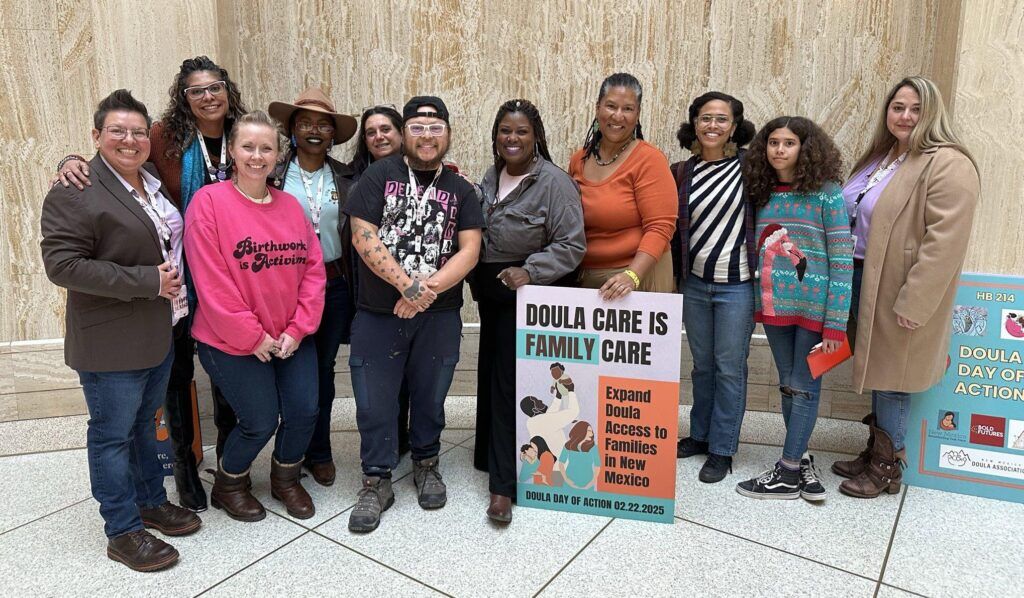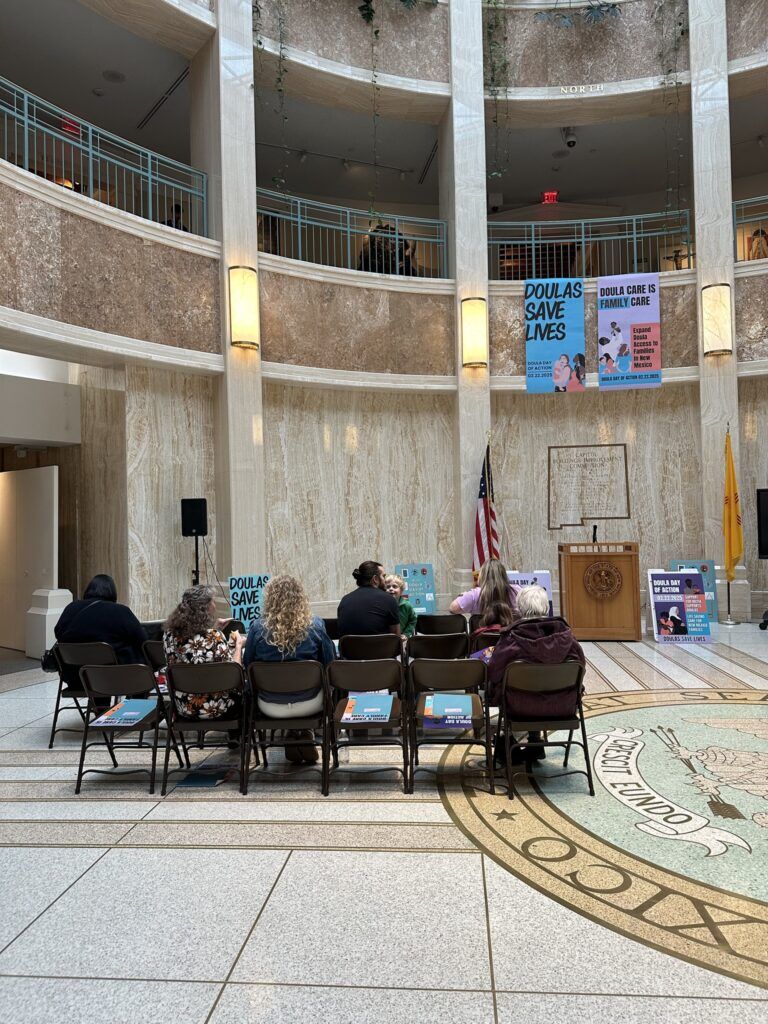When New Mexico’s doulas took their fight to the Capitol, they didn’t just win Medicaid coverage—they rewrote the rules to put community care at the heart of state law.
This essay is part of an ongoing Gender & Democracy series, presented in partnership with Groundswell Fund and Groundswell Action Fund, highlighting the work of Groundswell partners advancing inclusive democracy. You’ll find stories, reflections and accomplishments—told in their own words—by grassroots leaders, women of color, Indigenous women, and trans and gender-expansive people supported by Groundswell. By amplifying these voices—their solutions, communities, challenges and victories—our shared goal is to show how intersectional organizing strengthens democracy.
As abortion bans sweep the U.S., clinics shutter and gender-affirming care is criminalized, New Mexico accomplished something radical: It passed a law to pay doulas—because doulas save lives. In 2025, the state unanimously enacted HB 214, the Doula Credentialing and Access Act, creating the nation’s most comprehensive Medicaid coverage for full-spectrum doula care, including for abortion, miscarriage, pregnancy, birth, postpartum and loss.
This victory was decades in the making, a fight led by Black, Indigenous, Latinx, LGBTQ+, immigrant, disabled and community-based doulas. These care workers have long provided essential, unpaid labor in a healthcare system that overlooked them. Now, for the first time, their labor is recognized as essential health infrastructure.
HB 214 is more than a healthcare win. It is a transformative shift rooted in the Black feminist framework of reproductive justice. HB 214 embraces and extends that vision: Its parameters shaped by doulas whose lived experiences make them both healers and organizers. Their leadership shaped every part of the law—from full-spectrum care guarantees to hospital access and certification grounded in ancestral knowledge.
Research confirms what our communities have always known: Doulas save lives. Their presence improves outcomes, reduces unnecessary interventions, offers vital emotional, physical and advocacy support. Yet community-based doulas have been excluded from healthcare systems and policymaking.

In New Mexico, where Medicaid covers over 70 percent of births, that exclusion has had deadly consequences. Pregnancy-related mortality was 31 per 100,000 from 2015–2020, with rates in Native communities at 52.9, among Medicaid recipients at 41.0, and in Black women and birthing people (just 2 percent of the population) suffering similar or worse outcomes, although hidden by disaggregated data. Structural racism renders Black lives invisible—even in death.
Doulas are a powerful counterforce, offering culturally rooted advocacy, education and consistent presence in a profit-driven healthcare system. They listen. They believe. They tailor care to each client, centering dignity and autonomy.

HB 214 enables a return to traditional ways, where community care members hold their people in wellness. It ensures those impacted by systemic failures have access to full-spectrum care, and that doulas are paid, trained and respected. The bill funds a workforce that has long gone uncompensated.
While other states launched one-time pilot programs, New Mexico wrote reproductive justice into law. HB 214 doesn’t just reimburse care, but builds the infrastructure to sustain it. It also creates a permanent advisory council of doulas and community leaders to guide implementation.
The New Mexico Doula Association (NMDA), which I co-direct, has further invested in the people bringing HB 214 to life. Over the past two years, NMDA awarded scholarships and stipends to more than 100 doulas, supporting programs like Our Earth Community Birth and Postpartum Attendant Program, founded by Tintawi Kaigziabiher, a descendant of the African Diaspora. These investments are growing a new generation of full-spectrum caregivers.
Still, the system is not fully built for doulas. Credentialing and Medicaid enrollment remain mired in bureaucracy. NMDA is co-leading the rollout by providing one-on-one support, tools and training to help doulas navigate the system.
Alongside community members, NMDA co-director, Tauz TamuPovi, is simultaneously ensuring care models that reflect body and mind diversity. Disability justice is foundational to reproductive justice, and for too long, disabled doulas have faced inaccessible training, ableist assumptions and invisibility.
This movement doesn’t stop at the clinic door. Doulas are building programs that connect food justice, land access and birth work. In partnership with Shahid Mustafa of Taylor Hood Farms and the New Mexico Agrarian Commons, for example, initiatives aligned with Medicaid’s new “Food as Medicine” benefit recognize that clinical care must be accompanied by nourishment and healing land.
Still, as this vision takes root under HB 214, federal funding threats loom, including cuts to Medicaid, SNAP and reproductive health access—all part of a national strategy to defund care and increase control.
Community care workers have always filled the gaps left by broken systems. HB 214 is more than a policy win—it’s a blueprint for what happens when those most impacted lead. Rather than demand doulas fit into the system, New Mexico enabled the systems to follow doulas. That’s how change begins.
Believe in this future? Help protect it. Urge your state to follow New Mexico’s lead. Support local doula collectives. Push for policies that center care over control. The path forward is here—let’s walk it together.
Great Job Melissa Marie Lopez-Sullivan & the Team @ Ms. Magazine Source link for sharing this story.



